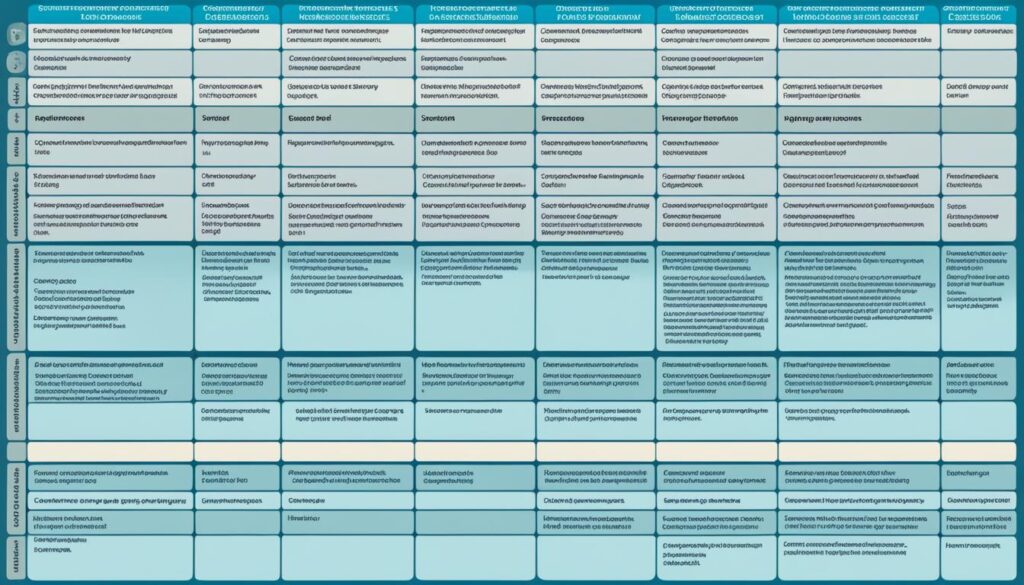Choosing the best software vendor is crucial for every business. It means looking beyond just the advertisements. It’s about finding a solution that truly meets your needs. You need to look at what your business needs, how well the software can change, its price, the vendor’s reputation, and if it can grow with you.
It’s very important to be clear about the costs. Software can be sold at fixed prices or you might pay as you use it. It’s smart to check what others say about the software. You can do this by reading reviews and talking to people who have used it. This gives you a good idea if the vendor and their software are trustworthy and if it’s worth the money.
Staying safe online is key. Make sure the vendor follows the required laws, protects your data, and checks for online threats. Also, watch out for any extra charges. See how easy it is to get back your data if you stop using the software. And always try before you buy. This is to make sure the software works for you.
Before you sign on the dotted line, know what you want to achieve. It helps to have a clear plan. This way, you can tell if the software is really helping your business. Using tools like G2 Track can show you where different software tools might overlap. This can make your business more productive and save you money.
Key Takeaways
- Essential to define business needs and evaluate software adaptability.
- Consider pricing structures, from fixed pricing to flexible models.
- Gather customer feedback through references and online reviews.
- Ensure robust security practices are in place.
- Establish key performance indicators before signing contracts.
Understand Your Business Needs
Knowing what your business needs in software is key. It’s the first step in picking the right software providers. Clear business requirements set the path for finding software that helps meet your goals.
Identify Must-Have Features
Picking out the necessary software features for success is vital. Make a list of what’s crucial and what would be nice to have. For example, life science companies need software that meets certain standards.
They should focus on features like integrations and user interfaces. This helps choose software that really supports their work.
Determine Nice-to-Have Features
While some features are essential, others are like a bonus. These nice-to-have features can make using the software better. They add to your satisfaction and how adaptable the software is for future needs.
Looking towards the future is important. This ensures the software you choose will grow with your business. By focusing on what your business truly needs, you can make a smarter choice. This approach makes aligning software with your long-term goals much easier.
Check Credentials and Certifications of Software Providers
It’s important to check the background and qualifications of software providers. This makes sure businesses work with the best. Choosing the right partner is key for success. It helps in using a strong software vendor assessment framework.
Look for Industry-Relevant Certifications
Software vendor evaluation looks at certifications closely. Things like ISO standards show a provider meets high quality and safety marks. These signs show a vendor is serious about doing well in the tech world. For instance, big names like Microsoft and IBM often mention their awards and recognitions. This shows they are solid and trustworthy.

Evaluate Vendor's Background and Stability
Looking into a software vendor’s past is crucial. This means checking their history, the skills of their team, and their financial situation. Knowing if they have grown steadily matters a lot. It reveals if they are stable. Things to look at for the software vendor assessment framework are:
- Experience: How long they’ve been in operation and their big projects.
- Financial Stability: Reports showing they are economically strong.
- Customer Feedback: Reviews, ratings, and testimonials from similar businesses.
By looking into these areas, you can pick a solid partner. They should help encourage new ideas and offer long-term support. Doing your research well and using a good software vendor evaluation model will steer you away from risky choices.
Collect and Analyze Customer Feedback
Getting feedback from customers is key in making smart decisions. It greatly helps in comparing software vendors. To really judge how well vendors do and if customers are happy, businesses need to listen to feedback closely.
Ask for Industry-Specific References
It’s smart to ask for references from within your industry. This way, you can see if a vendor really knows your industry’s unique problems. It gives you a better look at a vendor’s skills and if they match what you need.
Search for Online Reviews
Checking online reviews offers a wider look at how a vendor is seen. 67% of businesses look at these reviews when choosing a software vendor. Reviews show the good and the bad, so you get a fair view. This helps in making a choice based on real information, not just opinions.
By using these tips, companies can find software vendors that meet their needs. It’s about choosing those who can help reach the company’s goals effectively.
Evaluate Pricing and Hidden Costs
Understanding pricing is key when picking a software vendor. It’s important to know all the costs to avoid financial issues. Make sure to read contracts well to clear up any confusion.

Consider Transparent Pricing Models
Software vendors have fixed and flexible prices. Fixed prices are clear and work well for budgeting. But, flexible prices change based on needs and can be flexible. They may suit changing project needs but come with some cost unpredictability. Knowing these differences and choosing what fits your project is important.
Identify Hidden Fees
Hidden fees can harm your budget in software deals. These extra charges might involve:
- In-person training fees
- Document management services
- Initial setup and onboarding fees
- Annual maintenance costs
Closely looking at these points can help you plan better. Always ask about what happens to your data if the deal ends. Trying out the software first, like test-driving a car, is wise to check if it fits your needs without a big commitment.
| Cost Aspect | Potential Charges |
|---|---|
| Training Fees | In-person or virtual sessions |
| Document Management | Ongoing storage and access costs |
| Initial Setup | One-time setup and onboarding |
| Maintenance Fees | Annual maintenance and support |
Staying alert for hidden fees, and using tools like G2 Track, helps in the evaluation process. Clearly defining your selection criteria and open communication make for a stronger, better partnership.
Assess Scalability and Integration Capabilities
It’s key to look at a software’s ability to grow and work with other systems when picking a vendor. This makes sure the software can expand with your business. Also, it ensures the new software fits well with what you already have.
Understand Customization Options
When choosing vendors, checking their customization options is wise. Software that can change to meet your company’s needs is valuable. It allows you to create a solution just for you. This way, you don’t have to buy new software all the time.
Evaluate Integration with Existing Systems
It’s important to see how well the new software will blend with what you have. A bad match can cause trouble and cost extra to fix. Choose vendors known for making the switch smooth and costs low.
Here’s a quick checklist to guide your evaluation process:
- Assess the vendor’s technical capabilities in supporting scalability and integration.
- Check for positive feedback and testimonials regarding the vendor’s integration success.
- Review service level agreements (SLAs) for commitments relating to support and integration.
- Ensure the vendor’s solutions are compatible with modern, integrated systems.
Focusing on these areas helps companies choose the right software vendors. Making smart choices leads to growth and better productivity over time.
Key Factors to Consider in Software Vendor Selection
Choosing a software supplier is a big task. It takes a detailed look at many things to make the right choice. The first step is to know what your business really needs. Then, figure out what is a must and what is a bonus in the software. This helps match the software to your organization’s unique needs and set real expectations.
Looking at the vendor’s track record and stability is also important. You need to check the vendor’s history, credibility in the industry, and if they have the right certifications. This step makes sure they can support you well and meet the industry standards.
How happy their customers are is a big clue. You should ask for references in your industry and read their online reviews. Websites like G2 let you read real customer feedback. This gives you a clearer picture of what each vendor is good at and where they might fall short.
Understanding the costs fully is crucial too. Make sure you know about all possible fees, like setup or training costs. Also, check if the contract allows for price increases later on. Knowing all the costs up front helps you plan your budget well and prevents any surprises.
Don’t forget to think about if the software can grow with your business or fit well with other tools you use. It should be able to expand with your company or easily connect with your current systems. This can save you from having to make big changes down the road.
Following these steps in the software buying process leads to a deep examination. It helps pick a software vendor that not only meets your needs now but also supports your growth and innovation in the future.
Conclusion
Choosing a software vendor is a big decision. It requires careful thought and knowing what your company needs. Make sure you don’t rush it. With 70% of mistakes in picking vendors leading to time and money loss, a good process is critical.
Having your IT and Quality teams involved is key. They help to check if the vendor meets your technical needs. Observing demos and checking software compatibility, done by 90% of companies, is also important. This helps see if the software fits with what you already have.
Looking at the vendor’s pricing and contracts is just as crucial. Most companies prefer flexible payment models. Having clear contract terms is a must for 95% of them, preventing surprises down the road. It’s also very common for companies to audit vendors to ensure they follow good development and security practices.
Taking an informed approach and using a strong evaluation model makes a big difference. Carefully aligning your choice with your business goals, ensuring scalability, and keeping costs clear are vital steps. These measures help businesses pick the right vendors and succeed with their software.



